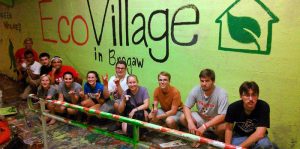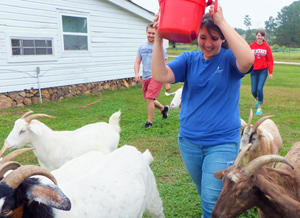Students live, learn sustainably in new campus EcoVillage

It can take a village to best learn about sustainability. And that’s what drew 63 NC State University students from varied backgrounds and majors to EcoVillage, a new on-campus, sustainability-focused living and learning community based out of Bragaw Residence Hall.
“[Before EcoVillage] I really didn’t know what areas fell under sustainability or how to lead a sustainable lifestyle,” said first-year student Austin Bowman.
But through service programs, education opportunities and a first-year student course on sustainability, Bowman and other students are learning what environmental sustainability is and why it matters.
“I’ve been made much more aware of my impact on the environment and how my decisions can affect the human population,” said Tyla McClain, a first-year student who joined the village to meet people and learn how to apply sustainability to her studies as a business major. “Getting involved in EcoVillage was a wonderful way to begin my first semester.”
The first semester for NC State’s class of 2017 has also been the first semester for EcoVillage, which is among the university’s newest living and learning villages. Uniting students from all majors around the goal of sustainable living and awareness, EcoVillage creates beyond-the-classroom experiences that encourage residents to lead, serve, create, problem-solve and engage in complex issues facing the globe.

Already students have harvested produce at Inter-Faith Food Shuttle Farm, which grows organic food for people in need across North Carolina; built the foundations for a living wall at Well-Fed Community Garden, an urban farm just two miles from campus; planted shrubs on campus during Parent’s Weekend; picked up litter along the Mountains-to-Sea Trail near Falls Lake; and hosted an informational booth at the campus celebration of America Recycles Day.
Village residents have also attended sustainability-related education opportunities on campus, including documentaries and seminars. In addition, first-year students, which account for nearly half of the inaugural class of village residents, took a 1-credit hour Environmental Studies course featuring a variety of presenters.
“I’m amazed by the faculty and distinguished individuals that donate their time to a group of college kids that haven’t yet made any noteworthy impacts,” said Andrew Harrell, a first-year student studying construction and management engineering. “Being part of EcoVillage has shown me the passion this campus has [for] sustainability.”
As a living and learning village, EcoVillage hasn’t been just about education and service. It’s also about building community. Four student mentors plan many of the village’s social programs such as “Pot Your Own Fresh Air” night, where students painted flower pots and planted seeds for indoor plants they can grow in their room.
“I very much enjoy being able to help students, especially those just starting out at NC State,” said Ashley McGuigan, a student mentor and senior majoring in plant biology. “Our villagers have so many innovative and original ideas on how to become more sustainable. It is inspiring to listen to their ideas and counsel them on where to take those ideas to further develop them.”
As EcoVillage enters its second semester, residents will have more opportunities for sustainability-related service and education, including a spring break trip to Boston to learn about sustainable urban development.
“The world as a whole is beginning to really focus on sustainability. EcoVillage teaches so much about this and therefore really prepares you for the future of the world,” Bowman said. “[This is] an amazing opportunity to make a difference.”
Ultimately, making a difference is what EcoVillage director Meghan Lobsinger hopes will be the village’s legacy. And in just one semester, she is already seeing the impact
“Most students on campus do not realize the power they have to drive positive change, so I am proud to see the EcoVillage realizing its potential and working together to make things happen,” she said. “I have high hopes for our ability as the EcoVillage to have an impact on NC State’s campus in the future.”
Students can apply to live in EcoVillage as part of the housing selection process, which begins Feb. 3 for current students and is ongoing for newly-admitted students.
- Categories: